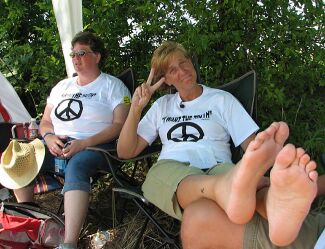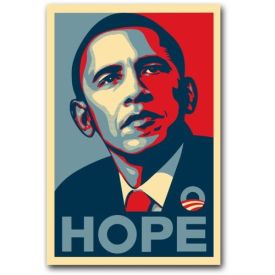All McKinneys Now
From The New CriterionAt a dinner party early last summer, some friends and I got to talking about why it was that the media, and especially the tabloid newspapers and the cable television news channels, were so obsessively interested in some stories and not in others which appeared to be at least superficially similar. In particular, we wondered what was the reason for their fascination with the case of Natalee Holloway, the Alabama teenager who had disappeared and was widely presumed to have been murdered — though at the time of this writing her body has not been found — while on a high-school graduation trip to Aruba. We compared the media’s feverish interest in her fate with the almost complete lack of same in the contemporaneous murder-kidnaping of the Groene children, nine-year-old Dylan and eight-year-old Shasta, of Coeur d’Alene, Idaho, by a convicted sex offender who had also murdered the children’s older brother and their mother and her boyfriend in the process of extracting them from their home. Poor Shasta, recovered alive before leading the police to the spot where her brother’s body was buried, was the family’s only survivor.
One explanation that found some favor was that people like to moralize — especially when moralizing can serve as a charm to ward off misfortune. Natalee Holloway, who was 18, had gone out to a bar called Carlos ‘n’ Charlie’s alone and late at night and had not returned to her hotel in the morning. It was believed that she had sought male companionship and had ended up with the wrong young man. Three local youths, including Joran van der Sloot, a 17-year-old Dutch boy living in Aruba who had been seen with Natalie the night before, were arrested by the authorities and then released for lack of evidence. The other two, Surinamese brothers Satish and Deepak Kalpoe who were friends of Mr van der Sloot’s, were later re-arrested. But whoever had made away with pretty, blonde Natalee, the media were not above hinting that through her imprudence she had in some degree been the author of her own destruction. She had done what sensible young women ought to know better than to do, particularly in a foreign country and in the company of a strange man or men. We may shake our heads about this and cluck our tongues and murmur ‘tis pity, but deep down inside some part of us is prepared to regard with satisfaction a tragedy the like of which we feel too wise to be visited with ourselves.
Poor murdered Dylan Groene offered no such consolation to the popular moralist. He had been snatched from his home along with his sister after those who might have protected him had themselves been killed by his killer. The man arrested for his kidnaping and murder, Joseph Edward Duncan III, was on the run from Fargo, North Dakota and some recently issued warrants against him. The murderer had apparently chosen the family at random and carefully planned his crime. Nothing that young Dylan could have done would have made any difference, even supposing he had had the foresight and maturity to have done it, and most probably the same was true of his mother, Brenda Kay Groene and her boyfriend, Mark McKenzie, and Dylan’s elder brother Slade. He was, they were, just unlucky, as anyone might be, to have come to the attention of an evil man. There is no comfort for anyone in contemplating such frighteningly unpredictable and ultimately unavoidable casualties of the human condition. For the most part, we prefer to avert our gaze from them.
This conversation came back to me at the other end of the summer when Hurricane Katrina roared ashore on the Gulf coast, punctured a levee and inundated New Orleans, causing a number of deaths — the first estimates were of thousands but they were subsequently revised downwards — and untold suffering, mainly among the poorest of the city’s residents who had been unable or unwilling to flee from the storm’s advance. Among those who remained many were sent to the city’s convention center and the football stadium known as the Superdome where such facilities as there were were soon overwhelmed. There and elsewhere in the city, there were widespread reports of crime, including looting and rape by armed gangs which prowled among the refugees. Even rescue helicopters were fired upon. Naturally, you might think, there could hardly help but be a Natalee-like invitation to smugness in these accounts of the victims’ improvidence or opportunism, or in the very fact of their having chosen to live in a city built below sea level and one which had long since been recognized as highly vulnerable to just such a catastrophe as this. Yet remarkably there was almost no hint of such self-satisfaction on the part of the high and dry media coverage, even in its subtext. Why was this?
Well, there is more than one way to moralize about a tragedy, and the way of the mainstream media for the past two years and upwards has been to confirm themselves and a significant and apparently growing proportion of their audience in a very different sort of self-satisfaction — namely the feeling of moral and intellectual superiority to and therefore contempt for President George W. Bush. The almost instantaneous assumption that the administration had bungled rescue efforts and so was at least as much to blame for the damage and loss of life as the storm itself reminded me of nothing so much as the tsunami of blame that had cascaded onto the venerable head of what Thomas Hardy called “the President of the Immortals” at the time of the Indonesian tragedy last Christmas (see “Showing That You Care” in The New Criterion of February, 2005). Bush had come in for some blame then too, of course, though God seems to have got the brunt of it — I think because the need to blame someone for all of life’s misfortunes has become a kind of structural necessity for the media, a natural corollary of the perpetual scandal hunt that they see as their raison d’être. What is the point of the media, anyway, if not to uncover the hidden truth of who bears the responsibility for things, especially bad things? So accustomed have they become to the Watergate paradigm, that it is easy to slip even God into the Richard Nixon role.
Fortunately for God, Bush spared His blushes about the disaster of Katrina by perfectly positioning himself to take the blame for the deaths in New Orleans, how many soever there might ultimately prove to have been. This was because the victims were predominantly black and his delay in coming to their aid obviously meant that he didn’t care about them. Even the fact that some of them were obviously criminal predators of the nastiest kind was not held against them, so long as the feeble response to the disaster of the Federal Emergency Management Agency, or FEMA, and its political masters was there to assume responsibility in their stead. As we have learned in the four years since the attacks on the World Trade Center and the Pentagon, the media’s search for someone to blame routinely scorns to pause over, let alone name, the most obvious culprits — the terrorists in the one case or the looters and rapists in the other — and focuses instead on those who may be accused, with whatever degree of plausibility, of neglecting a political or fiduciary responsibility to prevent them from causing harm to people. The underlying assumption in this approach to disasters, whether natural or man-made, is that of the plaintiff’s bar: that no matter what the misfortune, it can be accounted for in terms of someone’s negligence.
As it happens, there appears to have been a good deal of negligence in the official response to Hurricane Katrina and its aftermath, though most of it seems to me to be attributable to state and local officials rather than President Bush. My perception in this case, however, needs to be taken com grano salis, as I am a Republican and a supporter, however reluctant, of the President’s. Why should I assume that my understanding of the situation is any less tainted by partisanship than that of the media chorus whose glee at finding something else to blame on Bush could scarcely be contained? It is only one more indication of the melancholy truth, touched on with some frequency in these columns, that in our threadbare public culture everything that is not already politicized must and will be politicized. In the first hours after the storm hit, the state of Louisiana’s Democratic leaders, Governor Kathleen Blanco and Senator Mary Landrieu, were vying with each other to praise Michael Brown, FEMA’s director. But when the evacuation failed and public order broke down, both sides scrambled to be the first to blame the other. And why not, when it was obvious that finding somone to blame was going to be the response to the disaster both of the political and of the media cultures? Within ten days Brown was demoted and a no-nonsense admiral had taken his place. Once “the blame game” — as defensive administration officials inevitably but no less accurately called it — got going, it was pretty clear where most of the blame was going to go.
And if any blame, why not all? From slackness about taking over the control of relief efforts from local officials to a deliberate policy of abandoning the poor and black citizens of New Orleans to their fate seemed an easy leap to some. The despicable nature of such a wild charge might once have seemed shocking even to the President’s most determined opponents, but in a world where a member of Congress, Rep. Cynthia McKinney, has publicly accused the President of being complicit in the terrorist attacks of September 11th, 2001, we have grown inured to such things. The irrepressible Representative McKinney popped up on this occasion too, announcing that “as I saw the mostly African American families ripped apart, I could only think of slavery. Families ripped apart, herded into what looked like concentration camps.” This, by the way, of those who were rescued — not that that should interfere with similar imputations against those who had previously failed to herd them into what looked like concentration camps. Earlier, Jesse Jackson had described those abandoned, as he saw it, by the federal authorities as “desperate, perishing, dehydrated, babies dying. It looked like Africans in the hull of a slave ship.” Against such a rhetorical backdrop, I don’t know why anyone bothered to appear surprised when the “rapper” and well-known moralist Kanye West announced that “George Bush doesn’t care about black people!”
Mr West, who also believes that AIDS is a plot of the white government and power structure against black people, is not, perhaps — or not yet, anyway — to most respectable of witnesses. But that didn’t prevent the media of seeking, however gingerly, to ally themselves with him in this instance. “I don’t think Kanye West can support his view that George W. Bush just doesn’t care about black people,” announced Jacob Weisberg of Slate. “But it’s a demonstrable matter of fact that Bush doesn’t care much about black votes. And that, in the end, may amount to the same thing.” That “may” sounds to me to be the product of a deservedly bad rhetorical conscience, for they are not the same thing at all. Politically, Bush would be a fool to “care” about black votes in the sense of trying to win more of them by seeking to placate the Kanye Wests of the world. Not only would he find it impossible to win the good opinion of those who are so ready to believe the worst of him, he would alienate the great majority of his own supporters who sincerely believe that the sorts of things he would have to do to win more black votes would amount to bad policy. All this is no more than to say that Bush is not a Democrat and is unlikely to become one. But only the most cynical and jaundiced of commentators could imagine that this obvious fact “amounts to” a callous disregard for the lives of American citizens on the grounds that they didn’t vote for him.
Unfortunately, the media’s cynicism in more places than Slate seems well up to making such assumptions. We are all Cynthia McKinneys and Kanye Wests now. Moreover, such hyperbolical language makes it more difficult to see where politics really does come into the relief efforts. On the front page of The New York Times, a leaked report from within the administration confirmed what should have been intuitively obvious, namely that political considerations made any earlier intervention highly problematical. “Can you imagine how it would have been perceived if a president of the United States of one party had pre-emptively taken from the female governor of another party the command and control of her forces, unless the security situation made it completely clear that she was unable to effectively execute her command authority and that lawlessness was the inevitable result?” said the Times’s anonymous source. But inside the paper, such analytical sophistication seemed utterly beyond the likes of Maureen Dowd, Frank Rich, Tom Friedman, Bob Herbert, Paul Krugman and Nicholas Kristoff, to say nothing of the paper’s own editorialists. Throughout this crisis, as throughout all the others since 9/11, none of them had anything more to say than the latest reiteration of the first theme of the first lustrum of the third millennium — namely “I hate Bush,” repeated with ever more ingenious variations.
I myself sometimes I get a little tired of defending our president from his legion of media detractors. I have never been an admirer of his and occasionally long for the freedom to abuse him myself. It may even be that he was at fault in not acting more precipitately to bring federal assistance to the worst-affected areas of New Orleans. But his lack of quickness was more than made up for by the quickness with which the media leaped to the conclusion that his general moral perfidy was the necessary and sufficient condition of all that went wrong in that unfortunate city. My own criticisms seem trivial by comparison with this tidal wave of hatred attempting to pass itself off as analysis, intelligence, commentary and criticism. Yet no one either in the media or in the Democratic party seems to have reflected that the more things are found to pile up on the debit side of the President’s political ledger, the less credible any one of them is likely to be. If he gets blamed for everything, it becomes more and more probable that he will be blamed for nothing, at least by those who are not already taking the party line. Thus Senator Kerry showed that he had learned nothing from his failed attempt to attribute all the nation’s woes to his opponent in the last presidential election when he characterized the response to the hurricane as “a summary of all that this administration is not in touch with and has faked and ducked and bobbed over the past four years. What you see here is a harvest of four years of complete avoidance of real problem solving and real governance in favor of spin and ideology.”
 |
So what do you think, folks? Do you suppose that there is anything that Mr Bush has done or could conceivably do that would meet with the Senator’s approval, any more than it would that of Mr Kanye West? For weeks before the hurricane, it had hardly been possible to open a newspaper or turn on a television news broadcast without being exposed to the media’s blanket coverage of the protest of Mrs Cindy Sheehan outside the President’s ranch in Waco, Texas, where she charged that Mr Bush was a “war criminal” and had “lied” so as to start a war that was only designed to line the pockets of his cronies in the oil industry — or possibly, though the media were unaccountably reticent about reporting this one, to follow slavishly the dictates of the Israeli government on behalf of international Jewry. If there had been any credibility to such appalling accusations as these — and the media’s studious neutrality towards them could not but hint that there was — why should anyone have been surprised that such a moral monster wouldn’t think twice about allowing poor black people to die, or loading them onto their latter day slave ships?
Mrs Sheehan was the mother of a soldier, Casey Sheehan, who had been killed in Iraq. The younger Sheehan was, like all the soldiers deployed there, a volunteer, and had even volunteered for duty in Iraq. But his mother used what the media constantly and ridiculously referred to as her “moral authority” — as if there were not hundreds of other such bereaved parents, including Casey’s father, who took a quite different view of the matter from hers — to portray him as a pathetic dupe of the wicked and corrupt Bush junta who had sent him there under false pretenses. By August of 2005 the monstrousness of such accusations, which might otherwise have suggested only that poor Mrs Sheehan had become mentally unhinged by her grief, had become so routine that the media hardly even noticed it anymore. With unintentional comedy, Jim Hoagland of the Washington Post solemnly averred that the President “owes Sheehan the respect of the meeting she seeks — if she demonstrates that she will show him the respect any elected president deserves.” Such respect as may be shown, that is, apart from her promiscuous allegations that he is to be considered a liar, a war criminal, a terrorist, and a self-aggrandizing murderer!
How could the media not realize then, when they made the seamless transition from retailing outrageous charges against President Bush’s conduct of foreign policy to retailing outrageous charges against his conduct of the disaster relief effort, that their own credibility had to be seriously undermined? Surely, no one not already persuaded of the worst about the President would regard as reliable witnesses those who had found nothing remarkable in his being characterized as Mrs Sheehan characterized him? Meanwhile, the media were as usual congratulating themselves for sniffing out the guilty parties. “Katrina rekindles adversarial media,” heralded USA Today. Howard Kurtz of the Washington Post was positively euphoric: “Journalism seems to have recovered its reason for being,” he wrote, adding that the media’s “activist stance, which would have drawn flak had it come from American reporters in Iraq, seemed utterly appropriate when applied to the yawning gap between mounting casualties and reassuring rhetoric. For once, reporters were acting like concerned citizens, not passive observers. And they were letting their emotions show, whether it was ABC’s Robin Roberts choking up while recalling a visit to her mother on the Gulf Coast or CNN’s Jeanne Meserve crying as she described the dead and injured she had seen.”
Ah yes, real emotion! That’s what the media love to see, even when it is their own. Like Mrs Sheehan’s grief, it is the infallible guarantee of moral authenticity. Interestingly, Kurtz chose to end his celebration of his journalistic colleagues’ new-found purpose by casting aspersions on their former coverage of Natalee Holloway. “Maybe, just maybe,” he concluded, “journalism needs to bring more passion to the table — and not just when cable shows are obsessing on the latest missing white woman.” That seems rather a gratuitous slap at poor Natalee, who never asked to become either a moral exemplum or poster-girl for media irresponsibility. My apologies, then, for mentioning that, whatever else it may be, Miss Holloway’s example can serve as a melancholy reminder that the one thing media moralizing, implicit or explicit, can always be counted on to demonstrate is the ineffable smugness and self-righteousness of the moralizers.
Discover more from James Bowman
Subscribe to get the latest posts to your email.






